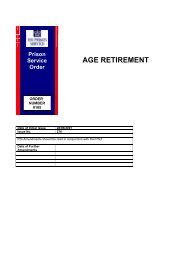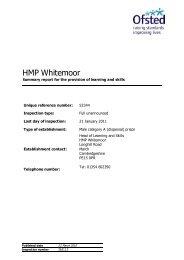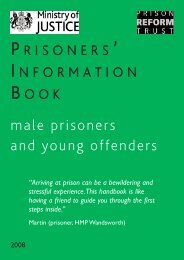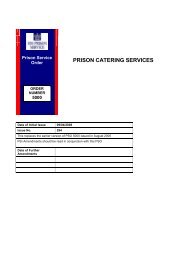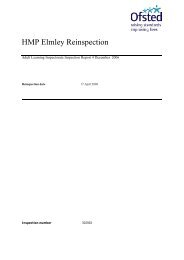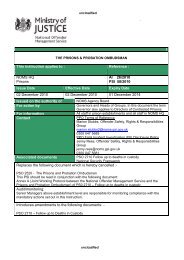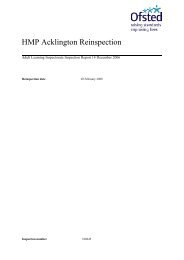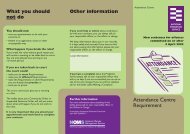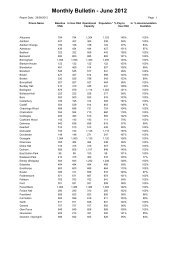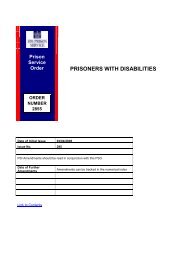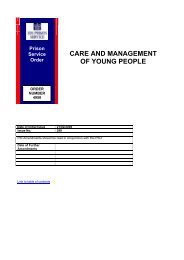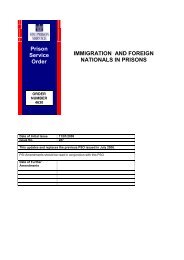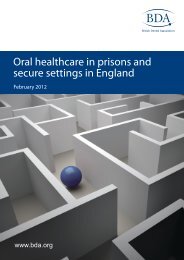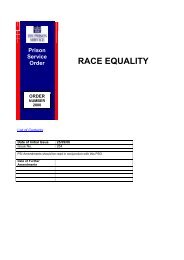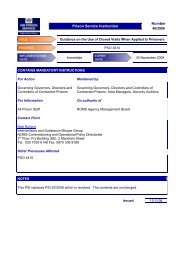PSI 2011-049 - Inside Time
PSI 2011-049 - Inside Time
PSI 2011-049 - Inside Time
Create successful ePaper yourself
Turn your PDF publications into a flip-book with our unique Google optimized e-Paper software.
UNCLASSIFIED PAGE 2114.10 However, the above paragraphs do not apply to a prisoner who is seeking asylum in theUnited Kingdom or who is detained under the Immigration Act 1971 and is makingrepresentations against their removal or deportation from this country on political, religious orethnic grounds.14.11 If a person is a citizen of a country which does not have consular representation in the UnitedKingdom, they must be treated in the same way as a citizen of the country which looks after itsinterests here. If there is no such country or the prisoner is stateless or a refugee, they shouldbe given all reasonable assistance in communicating with any international authority chargedwith protecting the interests of such persons, such as the United Nations High Commissionerfor Refugees.Samaritans14.12 Correspondence with Samaritans is subject to confidential handling. Prisoners maycorrespond with Samaritans in confidence by writing to a central service which has beenestablished to respond to prisoner‟s letters. The current address is:ChrisPO Box No. 9090STIRLINGFK8 2SA14.13 Freepost envelopes are available which are clearly labelled with both “Samaritans” and“Confidential Access”; and supplies of these envelopes can be obtained direct fromSamaritans Correspondence Branch at the address above.14.14 Staff must not read correspondence from a prisoner to Samaritans (or vice versa), even whenthey think it might be necessary to assess the prisoner’s risk of self harm. The fact that aprisoner is corresponding with Samaritans is a warning in itself that they may be at risk of selfharmor suicide and may need additional support.Registered Medical Practitioners14.15 Correspondence between a prisoner and a registered medical practitioner must be handledin confidence but only to the extent that the registered medical practitioner is acting in aprofessional capacity and the correspondence directly relates to the treatment of theprisoner.14.16 In these circumstances, any outgoing correspondence should be addressed to the namedregistered medical practitioner at their official practice address and clearly marked“Confidential Access” with the words “Medical In-Confidence” also written on the envelope.It should also have the prisoners name and number clearly written on the back of theenvelope. Likewise, incoming correspondence should be clearly marked “ConfidentialAccess” with the words “Medical In-Confidence” written on the enveloped and clearlydisplay the name and address of the treating medical practitioner and their officialidentifying marking (e.g. NHS Trust or hospital). If a registered medical practitioner iswriting to a prisoner in a social capacity, i.e. that individual is a friend or colleague, then theletter is not covered by the confidential handling arrangements outlined above.14.17 If there are good grounds to suspect that the correspondence has not originated from abona fide registered medical practitioner then staff must check with the individualconcerned or if necessary with the General Medical Council (http://www.gmcuk.org/doctors/register/LRMP.asp)for confirmation of their status. However, if staff assessthere is reasonable cause to stop and examine this mail, then the guidance contained inAnnex D must be followed.<strong>PSI</strong> 49/<strong>2011</strong> UNCLASSIFIED ISSUE DATE 26/09/<strong>2011</strong>



